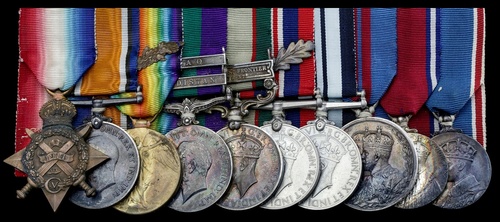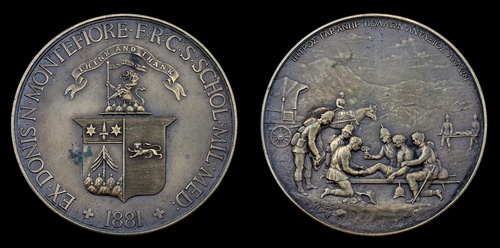Auction: 19003 - Orders, Decorations and Medals
Lot: 376
(x) The important C.B. group of eleven awarded to Major-General A. C. Munro, M.D., who served as Director of Medical Services in India during the Second World War, and was twice mentioned in dispatches; a bacteriologist of extraordinary genius, he became Honorary Physician to the King
The Most Honourable Order of the Bath (C.B.), Military Division, Companion's neck Badge, 55mm x 50mm, silver-gilt and enamel, with full neck riband for wear, in Garrard & Co. fitted leather case of issue, minor loss of red enamel in cauls of crowns, good very fine; 1914 Star (Capt. A. C. Munro I.M.S.); British War and Victory Medals 1914-19, with M.I.D. oak leaf (Maj. A. C. Munro.); General Service 1918-62, 2 clasps, Kurdistan, Iraq (Major A. C. Munro.); India General Service 1936-39, 1 clasp, North West Frontier 1936-37 (Lt-Col. A. C. Munro. I.M.S.); British War Medal 1939-45, with M.I.D. oak leaf; India Service Medal; Delhi Durbar 1911, unnamed as issued; Jubilee 1935; Coronation 1911, the medals mounted court-style as worn, nearly extremely fine (11)
M.I.D. London Gazette 7 February 1919.
M.I.D. London Gazette 16 December 1943.
Archibald Campbell Munro was born on 16 January 1886, the son of Dr. A. C. Munro, county medical officer of Renfrewshire. He lived at Oakbank, Oakshaw, Paisley. Educated at Glasgow High School, he graduated from Glasgow University with an M.B., Ch.B. in 1908, gaining an M.D. in 1911. That year he joined the Indian Medical Service, quickly becoming a Captain. He returned to England for further study shortly before the Great War, graduating from Cambridge University with a Diploma in Tropical Medicine and Hygiene on 1 September 1914. He also attended a summer course at the London School of Hygiene and Tropical Medicine, passing with Distinction (90%) and coming top of his cohort. He served initially on the Western Front, but in 1916 was posted to Mesopotamia. In that theatre he performed special duties behind enemy lines, providing medical aid to local tribesmen in their struggle against the Turks. For these services he was mentioned in Lieutenant-General Sir William Raine Marshall's dispatches. His specialist knowledge of hygiene saw him appointed staff officer (hygiene) at Advanced Base and Assistant Director of Medical Services at General Headquarters.
After the Armistice he resumed his studies at Cambridge, taking the Diploma in Public Health in 1923 and gaining further qualifications in Sanitary Science, Hygiene and Bacteriology. He was then chosen to command the station hospital at Landikotal, on the North-West Frontier, as Senior Medical Officer. He was appointed Director of Medical Services throughout India in 1941. He held this role during the bleakest phase of the Japanese offensive, amid a critical shortage of medical supplies in India. He performed well in difficult circumstances, and was again mentioned in dispatches. On 31 August 1943 he chose to relinquish this post to make way for a younger man. Lord Wavell, the Commander-in-Chief in India, wrote in a letter to the War Office:
'I meant to write to you about Campbell Munro, late Director of Medical Services in India. I wish to explain to you the circumstances of his retirement, i.e. that he himself, with considerable public spirit, offered to retire at the end of two years tenure of Office to make room for a younger man. There was no pressure brought to bear on him in any way. I think I mentioned this to you when I saw you in India, but I meant to put it on record in writing to you; however, in the hurry of events that have happened since then I forgot about it and should like now to do so. Campbell Munro did a very good job of work in the two years he held the appointment during a very difficult period.'
In recognition of his services, Munro was made a Companion of the Bath. He was Honorary Physician to the King from 1939 to 1943. Twice married, he fathered one daughter by his first wife. He died in Haslar Hospital on 6 July 1961, aged 75.
Sold with a full archive, including:
(i)
The recipient's M.I.D. certificates for both World Wars.
(ii)
The recipient's University of Cambridge diploma certificates in Tropical Medicine and Hygiene (dated 1 September 1914) and Public Health (dated 18 October 1923), both vellum, signed by the Vice-Chancellor, with red wax seals; also his certificate from the London School of Hygiene and Tropical Medicine (dated 30 July 1914).
(iii)
A signed letter sent to the recipient by The Earl Wavell, thanking him for his service in India and enclosing a copy of the letter sent by Wavell to the War Office.
(iv)
Five academic prize medals, comprising: London School of Hygiene and Tropical Medicine Prize Medal (2), by Wyon, 2 Langham Chambers, silvered bronze, the reverses engraved 'A. C. Munro. 1913-1914.' and 'A. C. Munro. May-July 1914.'; Royal College of Surgeons Montefiore Bronze Medal by A. Dubois, Paris (illustrated), unnamed as issued; Army Medical School Prize for Military Medicine Bronze Medal, unnamed as issued; Glasgow High School Physics Department Bronze Medal, the rim engraved 'Archibaldus C. Munro, in Classe Physica, 1903.', good very fine, all in fitted leather cases of issue (some cases damaged)
Subject to 5% tax on Hammer Price in addition to 20% VAT on Buyer’s Premium. For more information please view Terms and Conditions for Buyers.
Sold for
£1,600
Starting price
£1200







